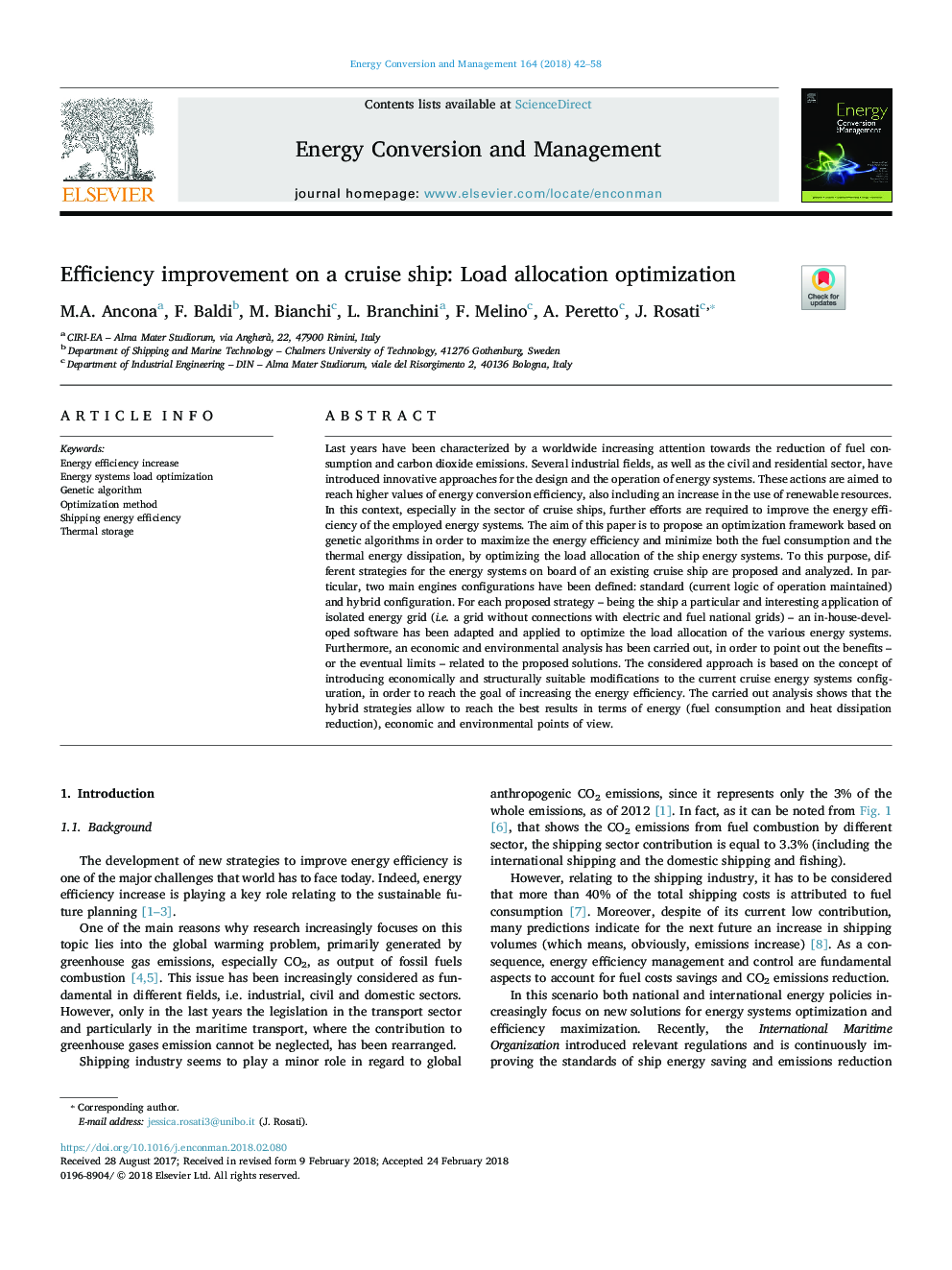| کد مقاله | کد نشریه | سال انتشار | مقاله انگلیسی | نسخه تمام متن |
|---|---|---|---|---|
| 7158674 | 1462798 | 2018 | 17 صفحه PDF | دانلود رایگان |
عنوان انگلیسی مقاله ISI
Efficiency improvement on a cruise ship: Load allocation optimization
ترجمه فارسی عنوان
بهبود کارایی در یک کشتی کروز: بهینه سازی تخصیص بار
دانلود مقاله + سفارش ترجمه
دانلود مقاله ISI انگلیسی
رایگان برای ایرانیان
کلمات کلیدی
بهره وری انرژی افزایش می یابد، بهینه سازی بار سیستم های انرژی، الگوریتم ژنتیک، روش بهینه سازی، بهره وری انرژی حمل و نقل، ذخیره سازی حرارتی،
ترجمه چکیده
سالهای گذشته با افزایش توجه جهانی به کاهش مصرف سوخت و انتشار دی اکسید کربن، مشخص شده است. چندین زمینه صنعتی، و همچنین بخش مدنی و مسکونی، رویکردهای نوآورانه ای را برای طراحی و بهره برداری از سیستم های انرژی معرفی کرده اند. این اقدامات با هدف دستیابی به مقادیر بالاتری از بازده تبدیل انرژی، همچنین شامل افزایش استفاده از منابع تجدیدپذیر است. در این زمینه، به خصوص در بخش کشتی های کروز، تلاش های بیشتری برای بهبود بهره وری انرژی سیستم های کار شده انرژی مورد نیاز است. هدف از این مقاله ارائه یک چارچوب بهینه سازی بر اساس الگوریتم های ژنتیکی برای به حداکثر رساندن بهره وری انرژی و به حداقل رساندن مصرف سوخت و انحلال انرژی حرارتی با بهینه سازی تخصیص بار سیستم های انرژی کشتی است. برای این منظور استراتژی های مختلف برای سیستم های انرژی بر روی کشتی یک کشتی کروز موجود پیشنهاد و تحلیل می شود. به طور خاص، دو پیکربندی اصلی موتور تعریف شده است: استاندارد (منطق فعلی عملیات حفظ شده) و پیکربندی ترکیبی. برای هر یک از استراتژی های پیشنهادی - استفاده از یک برنامه ویژه و جالب از شبکه انرژی جدا شده (یعنی یک شبکه بدون اتصال به شبکه های برق الکتریکی و سوخت ملی) - یک نرم افزار توسعه یافته در داخل کشور برای تخصیص بار از سیستم های مختلف انرژی. علاوه بر این، تجزیه و تحلیل اقتصادی و محیط زیستی انجام شده است تا منافع یا محدودیتهای احتمالی مربوط به راه حل های پیشنهادی را مشخص کند. رویکرد در نظر گرفته شده بر پایه مفهوم معرفی تغییرات اقتصادی و ساختاری مناسب برای پیکربندی سیستم های کروز انرژی کروز است تا به هدف افزایش بهره وری انرژی برسد. تجزیه و تحلیل انجام شده نشان می دهد که استراتژی های هیبریدی اجازه می دهد تا بهترین نتایج را از لحاظ انرژی (مصرف سوخت و کاهش تلفات گرما)، دیدگاه های اقتصادی و محیط زیست بدست آورند.
موضوعات مرتبط
مهندسی و علوم پایه
مهندسی انرژی
انرژی (عمومی)
چکیده انگلیسی
Last years have been characterized by a worldwide increasing attention towards the reduction of fuel consumption and carbon dioxide emissions. Several industrial fields, as well as the civil and residential sector, have introduced innovative approaches for the design and the operation of energy systems. These actions are aimed to reach higher values of energy conversion efficiency, also including an increase in the use of renewable resources. In this context, especially in the sector of cruise ships, further efforts are required to improve the energy efficiency of the employed energy systems. The aim of this paper is to propose an optimization framework based on genetic algorithms in order to maximize the energy efficiency and minimize both the fuel consumption and the thermal energy dissipation, by optimizing the load allocation of the ship energy systems. To this purpose, different strategies for the energy systems on board of an existing cruise ship are proposed and analyzed. In particular, two main engines configurations have been defined: standard (current logic of operation maintained) and hybrid configuration. For each proposed strategy - being the ship a particular and interesting application of isolated energy grid (i.e. a grid without connections with electric and fuel national grids) - an in-house-developed software has been adapted and applied to optimize the load allocation of the various energy systems. Furthermore, an economic and environmental analysis has been carried out, in order to point out the benefits - or the eventual limits - related to the proposed solutions. The considered approach is based on the concept of introducing economically and structurally suitable modifications to the current cruise energy systems configuration, in order to reach the goal of increasing the energy efficiency. The carried out analysis shows that the hybrid strategies allow to reach the best results in terms of energy (fuel consumption and heat dissipation reduction), economic and environmental points of view.
ناشر
Database: Elsevier - ScienceDirect (ساینس دایرکت)
Journal: Energy Conversion and Management - Volume 164, 15 May 2018, Pages 42-58
Journal: Energy Conversion and Management - Volume 164, 15 May 2018, Pages 42-58
نویسندگان
M.A. Ancona, F. Baldi, M. Bianchi, L. Branchini, F. Melino, A. Peretto, J. Rosati,
